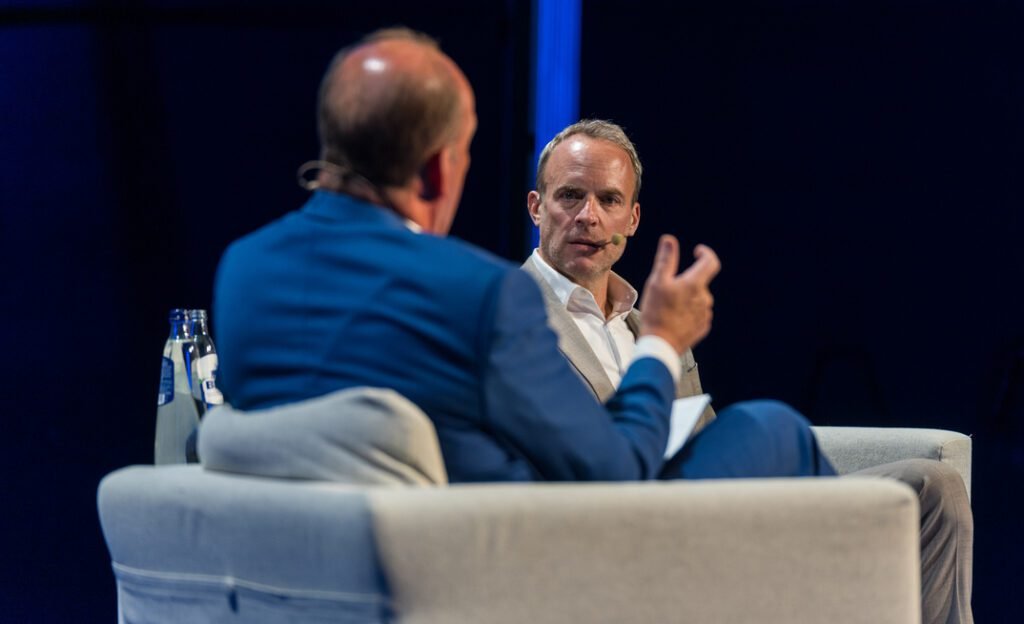Dominic Raab, former UK Foreign Secretary and a seasoned global strategist, is shining a light on an overlooked but urgent issue—how the Gulf Cooperation Council (GCC) can play a major role in securing critical minerals that power the clean energy revolution.
With the world shifting away from fossil fuels and towards renewable energy, demand for critical minerals like lithium, cobalt, nickel, and rare earth elements has surged. These minerals are essential in producing electric vehicles (EVs), solar panels, wind turbines, and batteries. According to Raab, the GCC—long known for its dominance in the oil market—has the potential to become just as influential in this new era of green energy.
The World’s Race for Critical Minerals Is Heating Up
Critical minerals are now viewed as “the new oil,” and just like oil in the past, their supply chain is becoming a focal point for geopolitical strategies. The global energy transition, climate goals, and industrial supply chains all depend on reliable and ethical sources of these minerals.

However, there’s a challenge: most critical minerals are currently mined and processed in a few countries—especially China. This creates supply risks and dependencies that worry governments and businesses alike. As Raab explains, “If energy was the global strategic driver of the 20th century, critical minerals will be the strategic gamechanger of the 21st.”
How the GCC Can Step In and Lead
The GCC includes some of the world’s fastest-growing economies—Saudi Arabia, the UAE, Qatar, Bahrain, Oman, and Kuwait. These countries are rich in capital, have strong infrastructure, and are already investing heavily in diversifying their economies. Raab argues they are uniquely positioned to become leaders in the global critical minerals supply chain in three major ways:
- Investment Power
GCC nations have the financial muscle to invest in mining operations abroad, particularly in Africa, Central Asia, and Latin America where most untapped mineral reserves are found. - Strategic Location
Located between Asia, Europe, and Africa, the Gulf has the logistical advantage of being a global hub for trade, making it ideal for mineral storage, processing, and transport. - Sustainability Goals
Countries like the UAE and Saudi Arabia have ambitious net-zero targets. Building a minerals strategy fits naturally into their energy transition plans and boosts their green credentials globally.
Saudi Arabia’s Big Bet on Mining
Saudi Arabia has already taken concrete steps toward this goal. The country launched its “Saudi Green Initiative” and is also running the “Future Minerals Forum,” aiming to turn the Kingdom into a global mining hub. The Ministry of Industry and Mineral Resources has allocated billions of dollars to develop mining infrastructure and attract global investment.
Raab applauds this progress but insists that this should be just the beginning for the region. “Saudi Arabia is sending a message to the world—this isn’t just about oil anymore. It’s about owning the future,” he said.

UAE’s Role in Building a Green Supply Chain
The UAE, too, is moving fast. With its strategic ports in Jebel Ali and Khalifa Port, as well as major logistics companies, the UAE can become a vital processing and distribution point for critical minerals. Masdar and ADNOC are already working on clean energy projects that could benefit from local mineral supply chains, reducing dependence on long and uncertain global routes.
According to Raab, “The UAE could become a global player not just in oil and finance—but also in the battery economy of tomorrow.”
Creating Local Jobs and Tech Growth
Another benefit of investing in critical minerals is the growth of high-tech industries. From mineral refining to battery manufacturing and clean tech startups, the entire supply chain can drive innovation and job creation. Young people in the Gulf—many of whom are educated and tech-savvy—stand to benefit from this industrial transformation.
“Critical minerals aren’t just about digging into the ground,” Raab said. “They’re about building the future of electric cars, smart grids, and green tech.”
Risks, Challenges, and the Need for Strategic Planning
While the opportunity is enormous, it doesn’t come without risks. Mining is often tied to environmental damage and political instability in supplier countries. Raab stresses the need for ethical and sustainable investment, supported by strong governance frameworks.
He also warns that competition for minerals is fierce. “The US, EU, China, and others are already racing ahead,” he said. “The GCC must move fast, smart, and collaboratively if it wants to lead.”
Partnerships and Global Influence

Raab encourages the GCC to build global alliances—both with countries rich in mineral resources and with those that manufacture clean technologies. Such partnerships can help the Gulf region secure long-term contracts, attract foreign tech, and share best practices.
The UK, for example, is already looking for reliable partners in the clean energy sector. Raab believes there is massive potential for joint ventures between British and Gulf companies focused on mineral supply chains.
A Wake-Up Call for Policymakers
In his recent opinion piece and speeches across international forums, Raab makes a compelling case for the Gulf’s critical minerals opportunity. He sees this not just as an economic choice, but as a strategic one.
“The GCC must not miss this moment,” he says. “It has the capital, the vision, and the global connections. What it needs now is urgency and focus.”
Conclusion: A Strategic Pivot from Oil to Minerals
Dominic Raab’s message is clear—if the GCC wants to remain a global energy leader, it must expand its focus beyond fossil fuels and invest in the resources that will define the next century. Critical minerals offer a once-in-a-generation opportunity to lead in a more sustainable, technologically advanced world.
This pivot could not only diversify the Gulf’s economies but also secure their geopolitical influence in a post-oil world. With visionary leadership and coordinated efforts, the region can turn this potential into real progress.
Read More: Airbus Deliveries May 2025: Company Records 4% Drop in May













